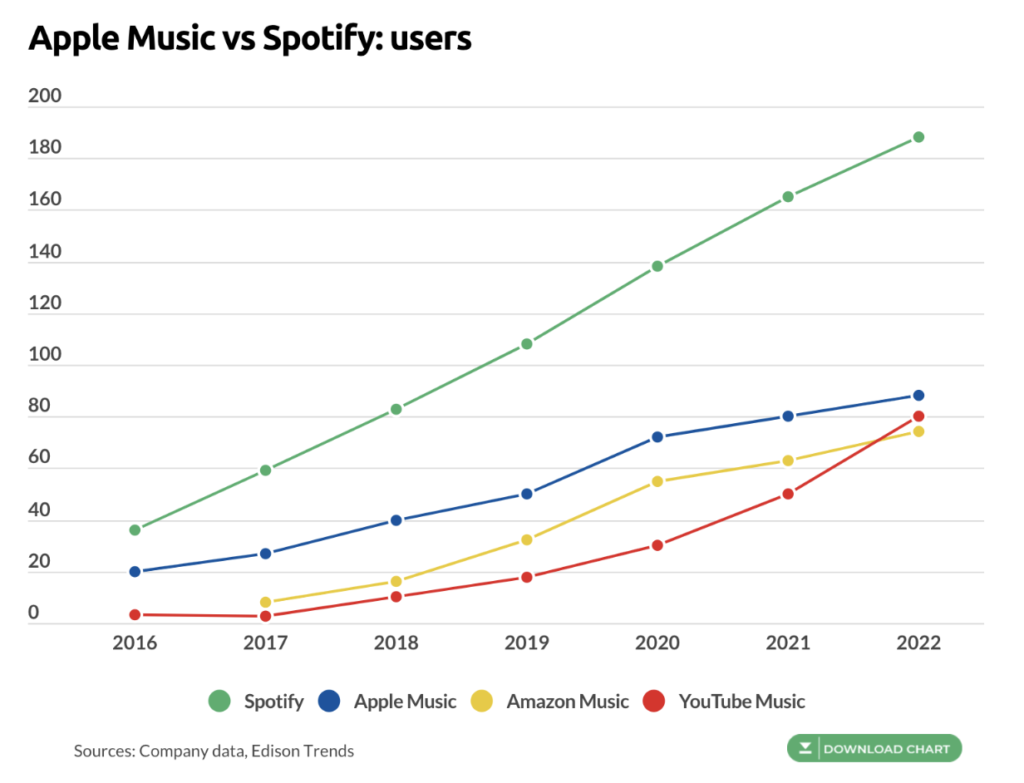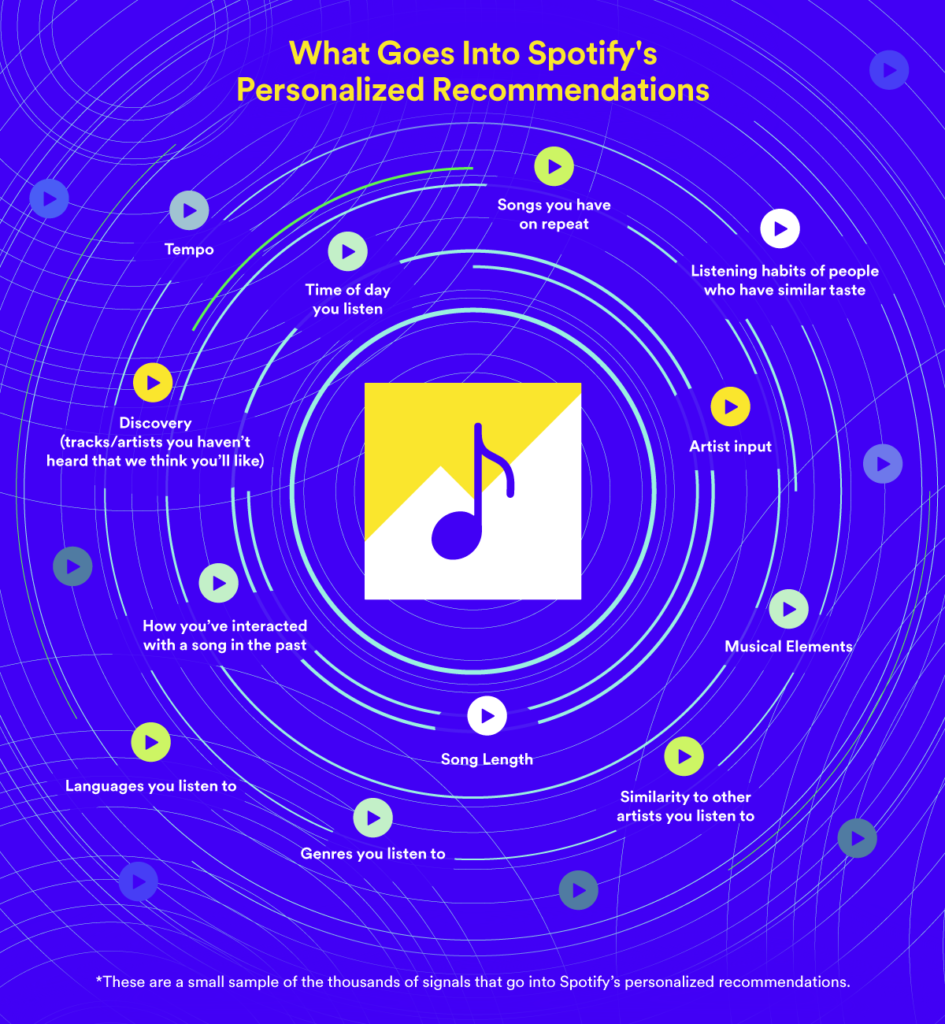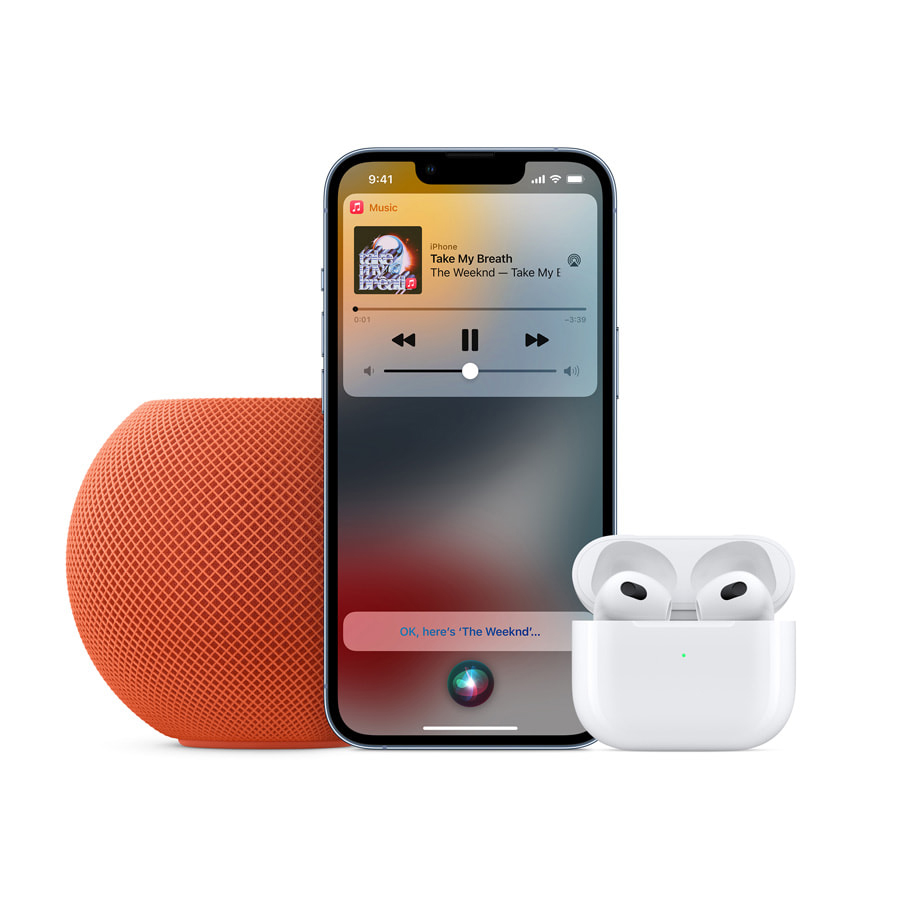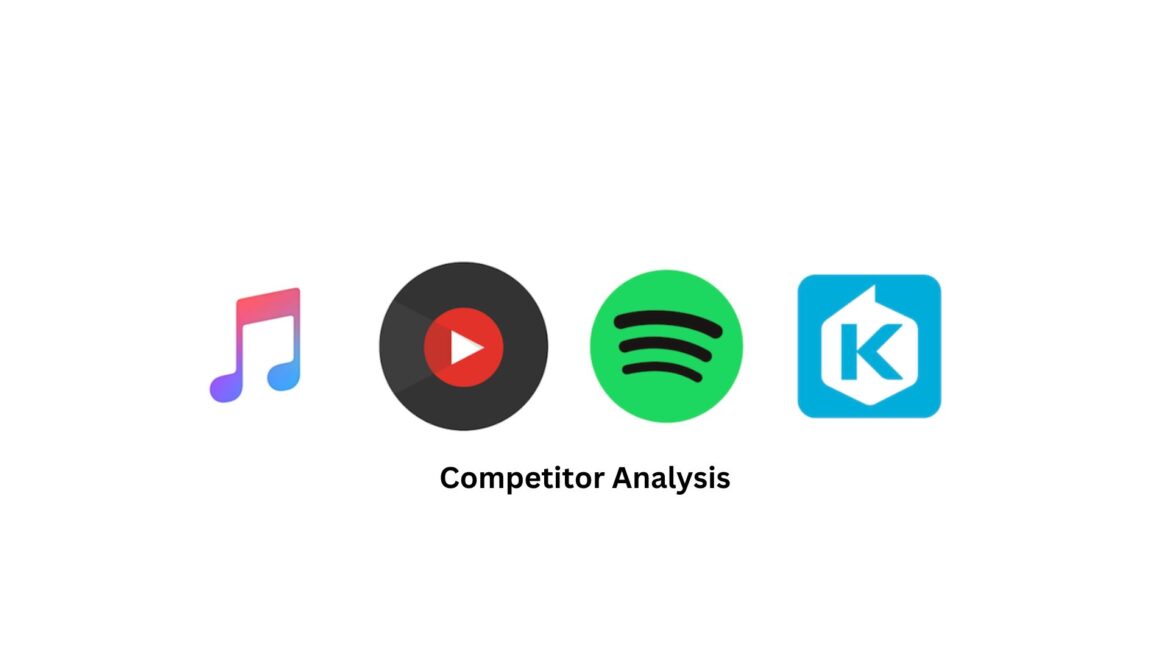在數位音樂串流領域,Spotify無疑佔有一席之地。自2008年成立以來,Spotify已經由一個小眾的瑞典公司,發展成全球最大的音樂串流平台,其用戶數量已達數億。近年來,音樂串流市場更可謂百家爭鳴。在本篇Spotify競爭者分析的文章中,我們將以Spotify、目前市佔率第二高的Apple Music,透過影音平台持續成長的Youtube Music,以及在華語市場中佔有一席之地的KKBOX,來作優劣勢、市場策略定位分析。
市場份額
Spotify
2023年統計,Spotify全球有4.89億的月活躍用戶,其中付費訂閱用戶超過2.05億(付費用戶中有四成是歐洲人),免費用戶約有2.95億。Spotify在音樂串流市場中的份額約為31%,為全球第一大。
Apple Music
2022年統計,Apple Music全球有8800萬的付費訂閱用戶(付費用戶中有六成是美國人),無免費版,在音樂串流市場中的份額為15%,為全球第二大。
Youtube Music
截至2021年底,Youtube Music有4100萬的付費訂閱用戶,為全球第五大,排在Amazon Music以及騰訊音樂之後。但作為影片平台的Youtube,音樂串流市場份額也正在急速上升。
KKBOX
以亞洲市場為主的KKBOX,截至2021年底付費用戶有200萬人,包含免費聽總用戶數超過1200萬人。

盈利模式
Spotify、Youtube Music、KKBOX
Spotify主要通過兩種方式盈利:付費訂閱和廣告收入。付費訂閱分為個人、家庭、學生等方案,提供無廣告、高音質和離線播放等功能。免費版用戶則會收聽廣告,為公司創造廣告收入。
Apple Music
Apple Music僅提供付費訂閱服務,無免費版本。訂閱分為個人、家庭和學生方案,提供無廣告、高音質和離線播放等功能。
優劣勢分析
Spotify
優勢
- 龐大的音樂庫:截至2023年,Spotify擁有超過1億首歌曲(也有說法是8000萬首,輸給apple music的1億首),音樂類型與風格也非常多樣化,每天約有10萬首新歌。
- 強大的音樂推薦與個性化功能:Spotify利用其專有的演算法,根據用戶的聆聽歷史和喜好推薦音樂。其中「Discover Weekly」每週為用戶推薦30首新歌曲,「Daily Mix」則根據用戶喜好生成不同風格的每日歌曲列表。且Spotify一直持續加強用戶體驗,如2023年改版。
- 社群互動功能:用戶可以創建、分享播放列表,並關注其他用戶或藝術家。此外,用戶還可以查看朋友正在聽什麼音樂,增加互動性和趣味性。
- 跨平台支持:Spotify支持Windows、Mac、iOS、Android等多個平台,並提供Web播放器,讓用戶隨時隨地享受音樂。
- Podcasts:Spotify還提供了大量的podcast內容,涵蓋多個領域,如科技、教育、娛樂等,滿足用戶的各種需求。

劣勢
- 對創作者的支付:與其他音樂串流平台相比,Spotify的支付率較低。導致某些獨家音樂或專輯不想在Spotify上提供。(Spotify pays artists between $0.003 – $0.005 per stream on average. Apple Music’s average pay per stream rate is between $0.007 and $0.01.)
- 獨家內容較少:相比於Apple Music等競爭對手,Spotify在獨家專輯和藝人內容方面相對較少。這可能會影響某些用戶的選擇。
- 隱私問題:Spotify過去曾因用戶數據隱私問題受到批評。例如,2015年Spotify的隱私政策更新引發了爭議,部分用戶對其收集的數據範圍表示擔憂。
- 新音樂較難被發掘:對於新興或獨立藝術家來說,由於Spotify上的音樂量龐大,有時可能難以在平台上脫穎而出,進而影響其發展。
- 與Apple設備的兼容性較不如Apple Music。
Apple Music
優勢
- 龐大的音樂資料庫:Apple Music有超過1億首的歌曲,每天也有十萬首新歌上架。
- 獨家內容:Apple Music經常提供獨家專輯、單曲和錄影帶,這對於吸引和留住用戶具有很大的吸引力。
- 蘋果生態系整合:作為蘋果公司的產品,Apple Music與其他蘋果產品(如iPhone、iPad、Mac和Apple Watch)和服務(如Siri和iCloud)實現了無縫整合。
- 豐富的藝人合作:Apple Music與眾多藝人合作,提供獨家專訪、演出和原創節目,增強了平台的吸引力。
- Beats 1電台:Apple Music提供全球直播的Beats 1電台,這是一個24/7不間斷直播的電台,邀請著名藝人和DJ擔任主持,播放熱門音樂和新歌首播。
- 音樂視頻內容:Apple Music有更大量的音樂視頻內容,包括音樂錄影帶、演唱會和獨家現場表演。
- 人工編輯推薦:Apple Music的人工編輯團隊根據用戶喜好提供精選歌單和新音樂推薦,讓用戶能夠更容易地發現喜愛的音樂。

劣勢
- 較弱的音樂推薦與個性化功能:相較於Spotify,Apple Music的音樂推薦和個性化功能可能不如對手。雖然Apple Music有類似功能如「For You」和「New Music Mix」,但它們在推薦準確性和個性化程度上可能稍遜色。
- 限定於蘋果生態系:Apple Music與蘋果生態系緊密結合,這對於非蘋果設備用戶可能造成不便。此外,Apple Music無法在某些智能音響設備上使用,如Google Home等。
- 無免費版本:Apple Music僅提供付費訂閱,無免費版本。這使得部分用戶在尚未決定訂閱前無法充分了解和體驗Apple Music的功能。
- 社交功能不足:與Spotify相比,Apple Music的社交功能相對較弱。用戶在創建和分享播放列表方面可能會受到限制,且無法查看朋友的聆聽歷史。
Spotify與Apple Music主要差異
- 訂閱選項:Spotify提供免費的入門訂閱,用戶需接受每隔約三首歌的廣告插播,每小時只能跳過六首歌,且音質較差。Apple Music則不提供免費訂閱。兩者的付費訂閱選項相似,但Apple Music的個人計劃價格高於Spotify£1。
- 音質:Apple Music的音質優於Spotify,支持高達24位/192kHz的無損音質。Spotify的最高音質為320kbps。
- 兼容性:Spotify支持更廣泛的設備,如遊戲機(PS4、PS5、Xbox One、Xbox Series X和Xbox Series S)以及多款智能手錶。Apple Music則優先支持蘋果設備,但也兼容部分其他設備,如Xbox、PS5(不包括PS4)、Roku等。
- 獨家內容:Apple Music有較多的獨家音樂和專輯,而Spotify則以其音樂推薦和個性化功能著稱。
Youtube Music
優勢
- 影片平台起家,可將影片和音樂結合,提供多元化的內容。
- 良好的用戶評論和互動機制。
- 可以觀看音樂視頻、現場表演等。
- 廣泛的用戶群,潛在的市場份額巨大。
劣勢
- 音樂專輯和歌曲組織不如專業音樂平台整齊。
- 音質不如Spotify、Apple Music高。
KKBOX
優勢
- 強大的亞洲音樂庫,特別是華語歌曲。
- 與華語地區藝人和唱片公司已建立良好的合作關係。
- 有更多機會與華語地區聽眾透過線下音樂活動來互動。
劣勢
- 國際市場份額相對較小。
- 音樂庫規模相對較小,特別是非亞洲地區的音樂。
- 較弱的音樂推薦與個性化功能。
- 國際品牌知名度相對較低。
- 騰訊音樂等新平台可能造成其威脅。
市場策略分析
品牌形象與定位
Spotify: 主打音樂推薦和個性化功能,聚焦年輕用戶群體,強調社交互動。
Apple Music: 著重高品質音樂體驗和獨家內容,並強調與Apple生態系的整合。
KKBOX: 針對亞洲市場,特別是華語音樂市場,強調地區音樂內容。
YouTube Music: 以視頻音樂為核心,提供音樂視頻、直播表演等多元化內容。
市場營銷與推廣
Spotify: 利用社交媒體、藝人合作和內容創建者合作進行營銷。
Apple Music: 利用蘋果品牌的影響力,並通過獨家內容和藝人合作吸引用戶。
KKBOX: 舉辦音樂活動、線上直播和藝人合作來吸引亞洲用戶。推薦文章:[NYU ESSAY] 疫後的音樂商業分析 | KKBOX風雲榜個案研究
YouTube Music: 依靠YouTube平台的巨大流量,並通過廣告和推薦系統進行推廣。
合作夥伴與聯盟
Spotify: 與各大唱片公司、獨立音樂人和播客創作者建立合作關係。
Apple Music: 與唱片公司、藝人以及其他蘋果產品和服務建立緊密聯盟。
KKBOX: 與亞洲地區唱片公司、藝人和音樂活動組織者合作。
YouTube Music: 與唱片公司、藝人以及YouTube平台上的音樂創作者建立合作關係。

